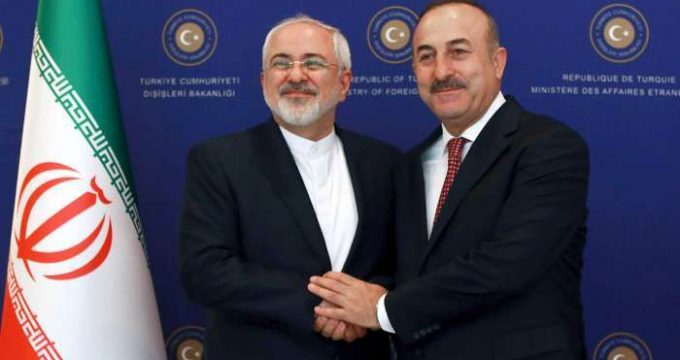PHOTO: Iranian and Turkish Foreign Ministers Mohammad Javad Zarif and Mevlüt Çavuşoğlu in Ankara on Friday
LATEST
Iran is proclaiming a breakthrough in its strategy over the Syrian crisis, moving towards cooperation with Turkey.
Tehran and Ankara have been on opposite sides since Syria’s uprising began in March 2011. Turkey has supported the Syrian opposition and rebels, while Iran’s economic and military aid has been essential to the survival of the Assad regime.
However, Iranian Foreign Minister Mohammad Javad Zarif declared on Friday, after meeting Turkish counterpart Mevlüt Çavuşoğlu in Ankara that “important views are shared between Turkey and Iran on Syria”. These included protecting “Syria’s territorial integrity” and ensuring “that the Syrian people should decide their own future”.
Zarif pointed to the significance of a reconciliation between Turkey and Russia — the leading ally of the Assad regime — with a meeting between leaders Recep Tayyip Erdoğan and Vladimir Putin in Moscow earlier in the week.
See Turkey Feature: Erdogan & Putin Pledge Renewal of Turkish-Russian Ties
While holding up a new Iranian-Russian-Turkish relationship over Syria, Zarif indicated that some work remains: “We will continue negotiations despite differences.”
But the Foreign Minister highlighted Tehran’s strategic push, with loud support for Erdoğan after a failed July 15 attempt to overthrow the President: “[Iran] believes the era of bullying and coups is over….That’s why all the Iranian officials…condemned the coup.”
Turkey’s Çavuşoğlu echoed Zarif’s line that Turkey and Iran “would strengthen cooperation for a lasting peace in Syria”. He referred to differences in their views but said, “We believe that Iran can have a constructive role in Syria.”
While the Islamic Republic may be hoping for a Turkish break with the Syrian opposition and rebels, Ankara may be looking for a different outcome with an assurance of President Assad’s departure and a resumption of talks for a transitional governing authority.
Despite its reconciliation with Russia, Ankara has reportedly supplied rebels during an offensive that has shifted the balance of power in the fight for Syria’s largest city Aleppo.
Supreme Leader’s Aide: US & Saudi Intervention in Syria “Illegal”
The senior adviser to the Supreme Leader has denounced Washington and Riyadh’s “intervention” in Syria, in contrast to the support of Iran, Russia, and Hezbollah for the Assad regime.
Ali Akbar Velayati said on Saturday:
The presence in Syria by such countries as the US and Saudi Arabia, who intervene there without the Syrian Government’s consent, is illegal.
Making decisions as to Syria’s future is up to Syrian people. Others are disallowed to meddle in Syria’s internal affairs.
Velayati also used the photo opportunity, with the Cuban Vice President Ricardo Cabrisas, to bolster Iran’s courtship of Turkey. He said the Islamic Republic is “the real friend of the Turkish government and nation”:
Despite the disagreement between Tehran and Ankara, Iran helped the Turkish nation and government to thwart the coup attempt and supported the legitimate government in Turkey.
Grand Ayatollah’s Audio Details Regime Complicity in 1980s Mass Executions
An audio conversation with an Iranian Grand Ayatollah, released after almost 30 years, has stoked political controversy about regime complicity in the mass execution of political prisoners in 1988.
The household of Grand Ayatollah Hossein Ali Montazeri — a candidate for Supreme Leader until he was ostracized and later put under strict house arrest — released the audio on Tuesday.
In the conversation, Montazeri speaks with four of the 16 members of the “death commission”, which oversaw the executions. to set out his grave concern and opposition.
The audio bears out Montazeri’s recollection in his memoir:
I told them that they should stop the executions during the month of Moharram. Mr. Nayeri [one of the members] responded: “We have so far executed 750 people in Tehran, and we have identified another two-hundred and fifty people. Allow us to get rid of them and then we’ll listen to you.”
During two months in 1998, an estimated 4,000 to 5,000 prisoners were killed. Most were part of the People’s Mojahedin of Iran, considered a terrorist organization by the regime, but some were supporters of other leftist factions and others were members of ethnic and religious minority groups such the Kurds and Baha’i.
According to Ayatollah Montazeri, a three-person committee interrogated all political prisoners in trials that lasted only a few minutes. Any detainees who answered “No” to key questions — Are you a Muslim? Do you pray? Do you support the Islamic Republic? — was killed.
In part because of his opposition to the killings and the rule of the Supreme Leader, Montazeri was ostracized by Ayatollah Khomeini shortly before Khomeini’s death in 1989, and Ayatollah Ali Khamenei became Leader. Eight years later, Montazeri was put under strict house arrest, remaining there until his death in 2009.
The regime has already hit back at the revelation of the audio. Friday Prayer leaders denounced outlets such as BBC Persian which featured reports.
Top Politician: Opposition Leader Mousavi Must Remain Under House Arrest
A leading conservative politician has said that Mir Hossein Mousavi, the leader of the opposition Green Movement, must remain under a 5 1/2-year house arrest.
Mohammad-Reza Bahonar said Mousavi turned down an offer of release if he refrained from political activities.
For that reason, house arrest is “the best condition” for Mousavi, who “lost” the disputed 2009 Presidential election to Mahmoud Ahmadinejad, said Bahonar.
“Sometimes [such people] want to get out and start a campaign. Well, it is clear that in such a case the system will not give them permission for such a thing,” he added.
Mousavi was put under strict house arrest in February 2011 with his wife, academic and artist Zahra Rahnavard, and fellow 2009 Presidential candidate Mehdi Karroubi.

